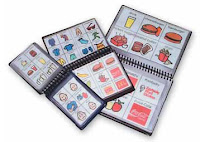Communication
Augmentative and Alternative Communication, or AAC, refers to any type of commucation that assists those who may have difficulties with speech, language or writing. Devices can range from low/no tech, like gestures or signing, to advanced software and hardware. AAC gives the power of communication to those who cannot express themselves verbally.
 A low/no tech device is the Mayer-Johnson's Picture Communication Symbols
(PCS). It is one of many communication displays that utilize a library of
symbols and pictures to represent people or objects around the student.
The student can then point to a picture to represent their message. For
example, pointing to a hamburger can mean, "I would like to eat a
hamburger". Although it seems to be very simple and basic, a
communication display, like the PCS, allows the student to make choices without
the frustration because of a lack to verbally communicate. A low tech device
such as this, however, requires that the person being communicated with pays
attention. Therefore, there must be a system in place that allows the
student to get the attention they need effectively.
A low/no tech device is the Mayer-Johnson's Picture Communication Symbols
(PCS). It is one of many communication displays that utilize a library of
symbols and pictures to represent people or objects around the student.
The student can then point to a picture to represent their message. For
example, pointing to a hamburger can mean, "I would like to eat a
hamburger". Although it seems to be very simple and basic, a
communication display, like the PCS, allows the student to make choices without
the frustration because of a lack to verbally communicate. A low tech device
such as this, however, requires that the person being communicated with pays
attention. Therefore, there must be a system in place that allows the
student to get the attention they need effectively.A VOCA device literally gives their user a voice. VOCA, or Voice Output Communication Aid, is a high tech device that uses the same concept as a low tech communication display, but adds a dedicated speech output apparatus. Depending on the technology, some basic VOCA devices can store certain messages while more advanced devices can have an almost limitless vocabulary. Mayer-Johnson also offers a series of VOCA devices called the DynaVox series. When the user
Accessibility
 Input devices differ from these devices because they are geared to provide accessibility to those who
have physical or cognitive difficulties, impairments, and disabilities. Hardware and software input devices must be compatible with a computer and its programs to work. Chorded Keyboards are a hardware option that replaces a standard keyboard for physically impaired users who may have difficulties sitting at a workstation. The keyboards have fewer keys, but letters are typed by hitting a combination of keys, like playing a musical chord on a guitar or piano. The BAT Personal Keyboard has only seven keys and is more similar to piano because it allows the user to rests their hand on top, with the fingers over four home keys and the thumb can move between the other three keys. The Twiddler is a pocket-sized mouse pointer and has full-function keyboard used similar to a guitar.
Input devices differ from these devices because they are geared to provide accessibility to those who
have physical or cognitive difficulties, impairments, and disabilities. Hardware and software input devices must be compatible with a computer and its programs to work. Chorded Keyboards are a hardware option that replaces a standard keyboard for physically impaired users who may have difficulties sitting at a workstation. The keyboards have fewer keys, but letters are typed by hitting a combination of keys, like playing a musical chord on a guitar or piano. The BAT Personal Keyboard has only seven keys and is more similar to piano because it allows the user to rests their hand on top, with the fingers over four home keys and the thumb can move between the other three keys. The Twiddler is a pocket-sized mouse pointer and has full-function keyboard used similar to a guitar.Some software input devices are already integrated into current computer systems such as speech and voice recognition programs. Speech recognition software allows people to give commands or enter information using their voices rather than relying on a hardware device, such as a mouse or keyboard. Of course, this requires a microphone attached to the computer in order to receive the signal, but again, many computers have integrated microphones into their systems. Through speech recognition programs, users can still create text documents like e-mails, browse the Internet and access various applications and menus installed on the computer.
No comments:
Post a Comment